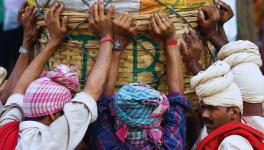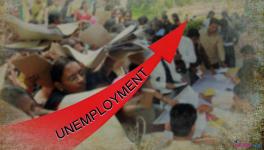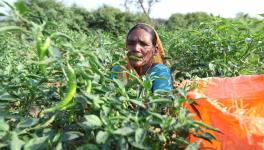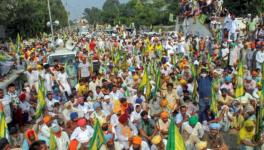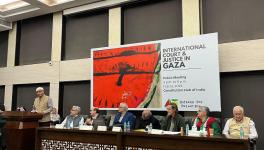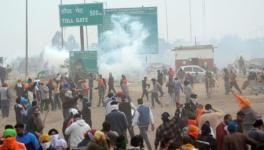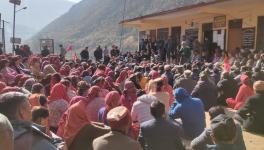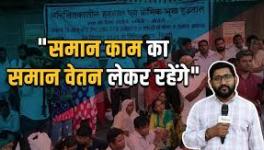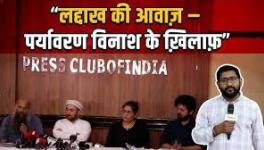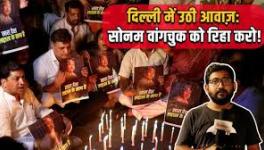Agrarian Challenges in South Africa
Mercia Lydia Andrews from the Trust for Community Outreach and Education, South Africa, speaks to Newsclick about the challenges in the agrarian sector in South Africa. She says despite the end of apartheid 20 years back, the situation in the countryside hasn’t changed all that much. Land is still owned largely by the white South African commercial farmers. In fact, 80% of agricultural land is in their hands. Agriculture is still very skewed and there is dualism – on one hand small farmers are farming on the margins with very little support and on the other there is very big commercial, highly mechanized agriculture. Andrews underlines that we must have common platforms around which we can build people-people solidarity across the world and learn from each other how to forge alternatives to the common enemies. Such platforms must have the interests of poor as opposed to the interests of profit very high on the agenda, she says.
Transcript:
Newsclick (NC): Since your work is primarily in South Africa, can you give us a sense of the key challenges in the agrarian scene?
Mercia Lydia Andrews (MLA): Well this is twenty years after the end of Apartheid so the challenges are still many and despite all the political changes and the fact that we now have a 'black' government elected by the people, the situation in the countryside hasn't changed all that much. Land is still owned largely by 'white' South African commercial farmers. In fact today they still own up to eighty percent of agricultural land. There is very little support for rural people, agriculture is still very skewed and there's a dualism in agriculture. So you have small holders, small farmers farming on the margins with no support, little support and you have very big commercial, highly mechanised agriculture.
NC: What has been your experience in building local level leadership in the communities you work with
MLA: Well I spend a lot of my life building popular organisations. It's much better now, it's easier for us to go into a community, work with locals and to begin to raise awareness of the issue and build leaders and build organisation. The challenge is not so much to build the organisation or to establish the organisation, the challenge is to sustain the organisation. That's more difficult because once you have an organisation it's always better when people win gains, when they make success then that helps the organisation to grow and the leaders to become stronger. So the challenge now is that often in relation to land it takes very very long time for people to win even a small piece of land. The second issue is that of money. In South Africa rural poverty is extreme and unemployment is very very high. So there's a great dependence on state grants and welfare and so on and people have very little money to organise themselves. Recently, in these last periods, we've become a bit innovative and my organisation has started an SMS mobile communication system, a free helpline. So lots of people in the rural areas have mobile phones and so if you're a farm worker and you've been evicted or you are dismissed, you can SMS us and we have a helpline and we can respond. So it's a way of communicating. We also send weekly messages about people's rights. So we have a database and we try and find innovative ways of organising. Recently we've also looked at a bicycle campaign for farm workers so that they can travel to areas to organise themselves. So I think the most important issue for us is to understand the challenges and to become innovative in how we work with communities. Other than that, I think, the other challenge is to build women's leadership to make sure that women have equal parts of the leadership. Often you will find many of the struggles, many of the members are women but when you look at the leadership it's not the same. It is not the women that are in the leadership. So how to break through those barriers? Those barriers are broken at many levels. Some of it is also because rural South Africa is still very traditional. We have a system of customary law where the chief in the area is very strong and now, for example, in the country there is a new... the government is trying to introduce a new bill called the Traditional Courts Bill and this bill, for example, says that communities must go back to communal ways, traditional ways of solving local problems. Yet one of the parts of this new bill, or legislation, is that women will not have the right to sit on this community council. They will be excluded. So how can you solve community problems without having women to represent themselves. So there are many daily challenges that we have to overcome to build strong leaders and to build strong organisation.
NC: Do you think it is possible for South Africa to leverage its membership of forums of governance like BRICS and IPSA to perhaps bring about a change in the rural scenario? Alternatively, what is the prospect of forging international solidarities?
MLA: We certainly play a big part in building a civil society platform that can monitor and engage with the BRICS process. So there's a lot of debate about the value of BRICS. Is BRICS an alternative to another reorgainsing centres of power? Is it the alternative? Well we think that, I don't believe the actions of the BRICS countries, the leadership of the BRICS countries, are very different from that of the United States. It's equally imperialistic, it's equally driven by profits and capital and so on and I think it's about making sure that the BRICS capital takes best advantage of local markets and making sure that they build a platform that can hold what is the traditional powerhouses in check. So the BRICS is yet to be... I think civil society has yet to become stronger to really forge an alternative BRICS agenda or BRICS aimed at the role of strengthening people's voices in BRICS.
NC: So what are the prospects for international solidarities?
MLA: I think the prospects for international solidarity is very big and it must be people to people solidarity. It must be us reaching out to the struggles, common struggles, common platforms because we have many things that we have in common. The poor in India, the struggles against land grabs, the struggles against water grabs etc. So there is a lot of commonalities. I think if you look at whether it's the struggle for women's rights, women to be in leadership, women to own land, women to take charge of their lives at many levels, these are common struggles whether it is in India or whether it is in Africa or in South Africa, Brazil. Let's take the question of women and violence. This is another issue where women can and men should be holding hands and building a common platform to ask why is this question of violence against women becoming such a big societal problem. So that's where we can build a solidarity. The question of land grabs, it's the same issue, problems are not dissimilar. Often it's the same multinationals for example those who bring GMOs. It is also Monsanto or Syngenta whether it is in India or whether it is South Africa or Brazil and so we have common enemies and we must find the common platforms around which we can build a people to people solidarity, where we can learn from each other how to struggle better, how to forge alternatives. So I am very optimistic, I'm very positive about the fact that we can and should create international platforms, global solidarity that's led by people and which puts the interest of the poor as opposed to the interest of profits, very high on the agenda. Yes.
Get the latest reports & analysis with people's perspective on Protests, movements & deep analytical videos, discussions of the current affairs in your Telegram app. Subscribe to NewsClick's Telegram channel & get Real-Time updates on stories, as they get published on our website.











